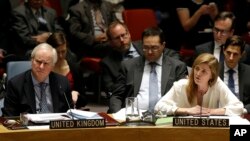Britain joined the United States on Tuesday, declaring that it cannot support a new Palestinian draft proposal calling for peace with Israel within a year and an end of the Israeli occupation of Palestinian territories by late 2017.
Jordan on Tuesday circulated to the U.N. Security Council a draft resolution prepared by the Palestinians, who said they want it put to a vote before Thursday. Washington said it could not support the draft because it was not constructive and failed to address Israel's security needs.
British U.N. Ambassador Mark Lyall Grant was asked by reporters whether his delegation could support the Palestinian draft.
“Well no,” he said. “There's some difficulties with the text, particularly language on time scales, new language on refugees. So I think we would have some difficulties.”
Lyall Grant did not explicitly threaten to use Britain's veto power to help block the Palestinian text if it is put to a vote. Western diplomats have said that if the draft is voted on before the new year it will likely fail to muster the required minimum nine yes votes for adoption.
That would mean neither Britain nor the United States would need to use their vetoes. Washington will not hesitate use its veto to strike down the Palestinian measure if necessary, council diplomats said.
All 22 Arab delegations endorsed the Palestinian draft on Monday, though Jordanian Ambassador Dina Kawar, the sole Arab representative on the 15-nation council, said she would personally have liked more time to consult on the draft.
The Arab delegations were meeting later on Tuesday to discuss when to put the Palestinian draft to a vote. Timing for a possible vote remains unclear.
Israel has said a Security Council vote, following the collapse in April of U.S.-brokered talks on Palestinian statehood, would deepen the conflict. It supports negotiations but rejects third-party time lines.
The Palestinians, frustrated by the lack of progress on peace talks, have sought to internationalize the issue by seeking U.N. membership and recognition of statehood via membership in international organizations.
Washington, council diplomats say, has made clear it does not want a resolution on the Israeli-Palestinian issue voted on before Israel's election in March.
The Palestinian draft resolution, obtained by Reuters, calls for negotiations to be based on territorial lines that existed before Israel captured the West Bank, East Jerusalem and the Gaza Strip in the 1967 Middle East war.
It also calls for a peace deal within 12 months, ending Israeli occupation by the end of 2017.
An earlier Palestinian draft called for Jerusalem to be the shared capital of Israel and a Palestinian state. The final proposal reverts to a harder line, saying only that East Jerusalem will be Palestine's capital and calling for an end to Israeli settlement building.





